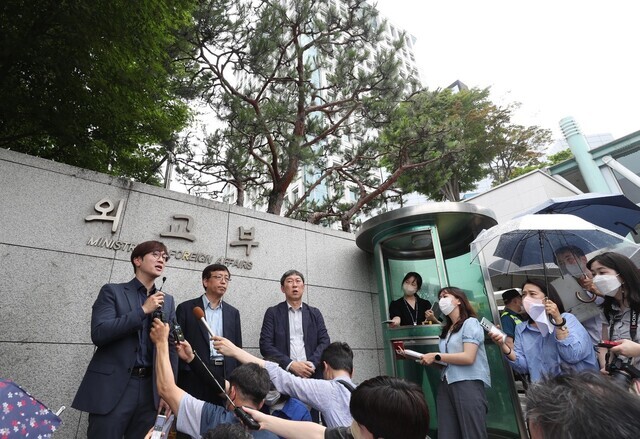hankyoreh
Links to other country sites 다른 나라 사이트 링크
Former forced laborers call on S. Korean government to invoke diplomatic protection

On Monday, the public-private consultative group that the South Korean government formed to resolve the issue of compensation for Korean victims of forced labor during the Japanese colonial period held its first meeting. There, representatives of the victims requested the South Korean government invoke diplomatic protection so that they can directly negotiate with the offending Japanese companies. Additionally, they hinted that if direct negotiation were to commence, they may delay the process of liquidation of certain Korea-based assets held by Japanese companies that used forced labor.
Members of a victims advocacy group as well as those legally representing the victims in the lawsuit against Nippon Steel, Mitsubishi Heavy Industries, Nachi-Fujikoshi, and others — companies that conscripted Korean laborers during the Japanese colonial period — held a press conference in front of the Central Government Complex Monday afternoon. There, they requested “the invocation of the South Korean government’s ‘right to diplomatic protection,’ which the Supreme Court of Korea’s verdict ordering compensation for victims of forced labor recognized.”
The right to diplomatic protection is a right recognized by international law through which a country can demand a foreign government for adequate protection or relief for its citizens by taking diplomatic measures when those citizens have been subjected to illegal or unjust treatment abroad.
The Supreme Court of Korea reached final verdicts for lawsuits concerning Nippon Steel and Mitsubishi Heavy Industries in October and November of 2018, respectively, ordering them to compensate Koreans forced to provide wartime labor for the companies. However, the Japanese companies refused to fulfill the ruling, which led to victims taking measures to liquidate assets held by these companies in Korea.
Observers say the court’s final ruling regarding the commencement of compulsory liquidation proceedings may be decided as early as this fall.
Monday’s first meeting of the public-private consultative group that took place at the Ministry of Foreign Affairs building was presided over by First Vice Minister of Foreign Affairs Cho Hyun-dong. The meeting was reportedly attended by 12 participants, among them academic experts such as Jin Chang-soo, director of the Center for Japanese Studies at the Sejong Institute, and Korea University professor Park Hong-kyu; as well as Suh Hyung-won, former South Korean ambassador to Croatia; Kim Min-chul, head of the history compilation division at the National Institute of Korean History; Seo Seok-soong, vice president of the Korea-Japan Economic Association; and lawyers Chang Wan-ick and Lim Jae-sung, the legal representatives of the victims.
After the meeting, a Foreign Ministry official met with reporters and said, “Participants proposed various opinions based on their experience with intimate communication with victims on the ground and their knowledge of South Korea-Japan relations.” They added, “Going forward, we will listen closely to the opinions of concerned parties and various circles including that of the victims and continue to make efforts to come up with a reasonable solution.”
The Ministry of Foreign Affairs plans to hold one to two more consultative meetings this month.
By Seo Hye-mi, staff reporter; Jung In-hwan, staff reporter
Please direct questions or comments to [english@hani.co.kr]

Editorial・opinion
![[Editorial] Yoon must halt procurement of SM-3 interceptor missiles [Editorial] Yoon must halt procurement of SM-3 interceptor missiles](https://flexible.img.hani.co.kr/flexible/normal/500/300/imgdb/child/2024/0501/17145495551605_1717145495195344.jpg) [Editorial] Yoon must halt procurement of SM-3 interceptor missiles
[Editorial] Yoon must halt procurement of SM-3 interceptor missiles![[Guest essay] Maybe Korea’s rapid population decline is an opportunity, not a crisis [Guest essay] Maybe Korea’s rapid population decline is an opportunity, not a crisis](https://flexible.img.hani.co.kr/flexible/normal/500/300/imgdb/original/2024/0430/9417144634983596.jpg) [Guest essay] Maybe Korea’s rapid population decline is an opportunity, not a crisis
[Guest essay] Maybe Korea’s rapid population decline is an opportunity, not a crisis- [Column] Can Yoon steer diplomacy with Russia, China back on track?
- [Column] Season 2 of special prosecutor probe may be coming to Korea soon
- [Column] Park Geun-hye déjà vu in Yoon Suk-yeol
- [Editorial] New weight of N. Korea’s nuclear threats makes dialogue all the more urgent
- [Guest essay] The real reason Korea’s new right wants to dub Rhee a founding father
- [Column] ‘Choson’: Is it time we start referring to N. Korea in its own terms?
- [Editorial] Japan’s rewriting of history with Korea has gone too far
- [Column] The president’s questionable capacity for dialogue
Most viewed articles
- 1Months and months of overdue wages are pushing migrant workers in Korea into debt
- 2At heart of West’s handwringing over Chinese ‘overcapacity,’ a battle to lead key future industries
- 3[Editorial] Yoon must halt procurement of SM-3 interceptor missiles
- 4Trump asks why US would defend Korea, hints at hiking Seoul’s defense cost burden
- 5Fruitless Yoon-Lee summit inflames partisan tensions in Korea
- 6Dermatology, plastic surgery drove record medical tourism to Korea in 2023
- 71 in 3 S. Korean security experts support nuclear armament, CSIS finds
- 8[Editorial] New weight of N. Korea’s nuclear threats makes dialogue all the more urgent
- 9First meeting between Yoon, Lee in 2 years ends without compromise or agreement
- 10Under conservative chief, Korea’s TRC brands teenage wartime massacre victims as traitors